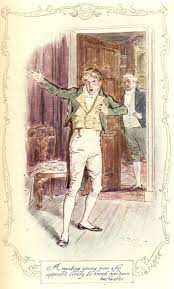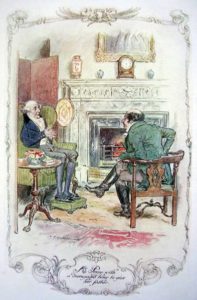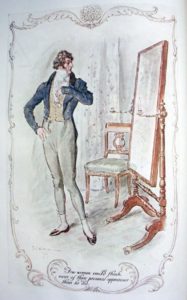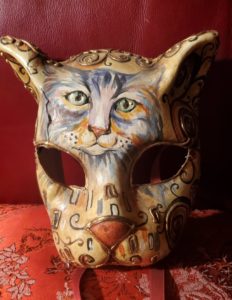
There is always something to learn from Jane Austen. Even when you sit down to write a light piece picking out some of your favorites among her infinite jests, you notice things you never saw before, and come to new observations, new conclusions. Last week, when I divided her books into the first three last week, with the three “mature” novels for this week, it starkly revealed to me a truth that has no doubt been obvious to many all along: that the two sets of books are markedly different in nature. The first three, Pride and Prejudice, Sense and Sensibility, and Northanger Abbey, are comedic beyond compare, so light, bright, and sparkling, as to show that in the morning and early afternoon of Jane Austen’s life and talents, she was bent on entertaining and delighting the world. No doubt she had her first taste of this satisfaction when reading her adolescent works to her family circle, and meant to make a sensation on a larger scale. When she has Elizabeth Bennet say, while teasing Mr. Darcy, that they are both “unwilling to speak, unless we expect to say something that will amaze the whole room, and be handed down to posterity with all the éclat of a proverb,” Jane Austen shows that she understands the appeal of making a dazzling impact! In her first three novels, there are indeed serious themes, as she invites you to think about her characters and how their actions have consequences – but her laughter is never still for long.
There was a long gap between the earlier novels, which she first worked on in the late 1790s, and her next full length novel, Mansfield Park, which she began in 1811. Without discussing the possible reasons for the gap (who has space and time!), by the time she was settled in her new Chawton home and embarked on the later novels, she was moving in different directions as a writer. The wit and epigrammatism, the Johnsonian balanced sentences, are still recognizably present in the mature novels, but the works themselves are more complex, evolved, some might say richer, and with a greater perspective of thoughtful wisdom. The humor is masterfully incorporated into the whole rather than serving as an end unto itself.
The author is now more mature in her life as well as her work, and it shows. In Mansfield Park, she deals more purposefully than ever in moral themes and social conditions for women. Where in the earlier novels, you could find jokes on every page, it becomes almost a puzzling exercise to pick out “the funniest moment” in Mansfield Park. Many things are wryly observed and satirically funny – just off the top of my head, I’ll mention Mrs. Norris “sponging” the cheesecake, Lady Bertram’s proverbial lassitude and empty headedness (I still laugh at her line, during the fraught drama of Fanny’s proposal from Henry Crawford, “And I will tell you what, Fanny, which is more than I did for Maria: the next time Pug has a litter you shall have a puppy.”
Wonderful moments, but not the classic farcical comedy of, say, Mr. Collins proposing to Elizabeth!
Still, for Mansfield Park I have made up my mind, and shall present as a favorite humorous moment, the farcical scene in which Sir Thomas discovers Tom’s theatre and finds himself in “his first appearance on any stage”:

“There were sounds from the billiard–room to astonish him still farther. Some one was talking there in a very loud accent; he did not know the voice—more than talking—almost hallooing. He stepped to the door, rejoicing at that moment in having the means of immediate communication, and, opening it, found himself on the stage of a theatre, and opposed to a ranting young man, who appeared likely to knock him down backwards. At the very moment of Yates perceiving Sir Thomas, and giving perhaps the very best start he had ever given in the whole course of his rehearsals, Tom Bertram entered at the other end of the room; and never had he found greater difficulty in keeping his countenance. His father’s looks of solemnity and amazement on this his first appearance on any stage, and the gradual metamorphosis of the impassioned Baron Wildenheim into the well–bred and easy Mr. Yates, making his bow and apology to Sir Thomas Bertram, was such an exhibition, such a piece of true acting, as he would not have lost upon any account. It would be the last— in all probability—the last scene on that stage; but he was sure there could not be a finer. The house would close with the greatest eclat.”
In Emma Jane Austen moves away from the rather dark, dour moral atmosphere of Mansfield Park. Emma’s is a lighter world, and she is a pampered, privileged, over confident heroine in complete contrast to the waiflike timid Fanny. The book is more visibly recognizable as comedic, and this time out the author is playing with, concocting, and examining all sorts of secrets and mysteries. The moral might be expressed by Mr. Knightley’s comment on Frank Churchill’s maneuverings: “Mystery — finesse — how they pervert the understanding! My Emma, does not every thing serve to prove more and more the beauty of truth and sincerity in all our dealings with each other?”
There is an abundance of farcical characters and of jokes, plenty to choose from. One of Austen’s trademark humorous and ironical devices is to show how sometimes things turn out exactly opposite than people suppose they will at first. For example, when the Bertram family is at pains to ensure that the boys will not fall in love with Fanny, and yet she turns out in the end to be the very daughter Sir Thomas wanted. In Emma Mr. Elton wants to marry Emma, Harriet wants to marry Mr. Elton, Emma is interested in Frank Churchill, and he is secretly in love with Jane Fairfax. It is like an artfully constructed comedy of love perhaps inspired by A Midsummer Night’s Dream and studded with funny, incongruous events (Harriet’s cherishing Mr. Elton’s broken pencil…Mrs. Elton’s attempts to rush Jane Fairfax into a situation against her will). A favorite scene of mine is Mr. Elton’s forcing his proposal onto Emma in the carriage, she is snobbishly appalled at how he “so well understands the gradations of rank below him,” yet is “so blind to what rose above, as to fancy himself shewing no presumption in addressing her!”
Mr. Woodhouse’s eccentricities are also reliably funny, though I perhaps enjoy most the moment when he is shocked by Frank Churchill talking of opening a window. “Open the windows! but surely, Mr. Churchill, nobody…could be so imprudent! I never heard of such a thing. Dancing with open windows!” Frank replies, “Ah! sir — but a thoughtless young person will sometimes step behind a window-curtain, and throw up a sash, without its being suspected. I have often known it done myself.” And Mr. Woodhouse exclaims, “Have you indeed, sir? Bless me! I never could have supposed it. But I live out of the world, and am often astonished at what I hear.”

Yet it seems vital to give you a delicious bit of good Miss Bates though I shall have to shorten her long speech by three quarters, or it won’t even fit in cyberspace:
“My dear Jane, are you sure you did not wet your feet? It was but a drop or two, but I am so afraid: — but Mr. Frank Churchill was so extremely — and there was a mat to step upon — I shall never forget his extreme politeness. Oh! Mr. Frank Churchill, I must tell you my mother’s spectacles have never been in fault since; the rivet never came out again. My mother often talks of your goodnature. Does not she, Jane? Do not we often talk of Mr. Frank Churchill? Ah! here’s Miss Woodhouse. Dear Miss Woodhouse, how do you do? Very well I thank you, quite well. This is meeting quite in fairy-land! Such a transformation! Must not compliment, I know — (eyeing Emma most complacently) — that would be rude — but upon my word, Miss Woodhouse, you do look — how do you like Jane’s hair? You are a judge. She did it all herself. Quite wonderful how she does her hair! No hairdresser from London I think could…Such a host of friends!…Upon my word, this is charming to be standing about among such friends! And such a noble fire! I am quite roasted. No coffee, I thank you, for me — never take coffee. A little tea if you please, sir, by and bye, — no hurry — Oh! here it comes. Everything so good!”

And finally we turn to the lovely Persuasion, which, though sometimes melancholy, and about the passage of time and lost chances, is also a beautiful love story with a very serious heroine. Anne is seldom caught in the act of being funny, but she has plenty of funny foils around her, most notably her super-vain father Sir Walter Elliott and cold, selfish sister Elizabeth. Almost every time they appear they are at once appalling, and hilarious. It would be hard to better Sir Walter’s observation that in Bath, “one handsome face would be followed by thirty, or five-and-thirty, frights; and once, as he had stood in the shop in Bond Street, he had counted eighty-seven women go by, one after another, without there being a tolerable face among them.”
However, I am going to choose a speech by a much more likeable character, Admiral Croft, who has something to say about Sir Walter, in his blunt, honest manner. He is telling Anne of some of the changes he and his wife have made at Kellynch, and he says, “Indeed, I must do ourselves the justice to say, that the few alterations we have made have been all very much for the better. My wife should have the credit of them, however. I have done very little besides sending away some of the large looking-glasses from my dressing-room, which was your father’s. A very good man, and very much the gentleman I am sure; but I should think, Miss Elliot” (looking with serious reflection), “I should think he must be rather a dressy man for his time of life. Such a number of looking-glasses! oh Lord! there was no getting away from oneself. So I got Sophy to lend me a hand, and we soon shifted their quarters; and now I am quite snug, with my little shaving glass in one corner, and another great thing that I never go near.”
Shall the verdict be read? Yes, it will: and the conclusion is that, beyond a doubt, Jane Austen, among a vast many qualities of genius, was also one of the funniest authors who ever lived! Please delight me in the comments with some of your favorites of Jane’s jokes, and your thoughts about the differences between the novels. And you can go back and read last week’s Part 1 of this post here: https://austenvariations.com/joking-with-jane-austen-in-january-by-diana-birchall/

Venetian Cat mask from collection of Diana Birchall

11 comments
Skip to comment form
testing comment
“I cannot speak well enough to be unintelligible.”–Catherine Morland in Northanger Abbey
Author
Classic, perfect and Jane at her most brilliant – thank you, Susan!
I love that line!!
So honest and sincere, yet, unconsciously, slapping all the “fine” people in the room…
Author
It is the wittiest comment, as Henry acknowledges, yet we wonder if innocent Catherine knows herself just how witty it is!
I thank you again for making me think more on the humorous part of Jane Austen’s lines… While I appreciate them whenever re-reading one of the works, I tend to overlook the intention of humour, I suppose ..
So here are two of my favourite – and, yes, I tried hard to avoid Pride and Prejudice’s ones….🤓😁
“We have been exactly a quarter of an hour here,” said Edmund, taking out his watch. “Do you think we are walking four miles an hour?”
“Oh! do not attack me with your watch. A watch is always too fast or too slow. I cannot be dictated to by a watch.”
(From Mansfield Park)
And of course the one I apply for myself as well:
“Oh! I always deserve the best treatment, because I never put up with any other”
(From Emma)
☕ Have a nice weekend!
Author
Two of the best, Mihaela, thank you so much: as I say it is simply great to see some of the best brought up again. I have always used “Do not attack me with your watch” as a catch phrase! And the Emma one is – well, pure Emma!
Oh I love Miss Bates!! She always has too much to say that she has to cut in on herself.
And I love that Mr Knightley has the talent to just know how to talk to her while being civil but also without spending too much of his time.
//
She was in the adjoining chamber while she still spoke, and opening the casement there, immediately called Mr. Knightley’s attention, and every syllable of their conversation was as distinctly heard by the others, as if it had passed within the same apartment.
“How d’ye do? how d’ye do? Very well, I thank you. So obliged to you for the carriage last night. We were just in time; my mother just ready for us. Pray come in; do come in. You will find some friends here.”
So began Miss Bates; and Mr. Knightley seemed determined to be heard in his turn, for most resolutely and commandingly did he say,
“How is your niece, Miss Bates? I want to inquire after you all, but particularly your niece. How is Miss Fairfax? I hope she caught no cold last night. How is she to-day? Tell me how Miss Fairfax is.”
And Miss Bates was obliged to give a direct answer before he would hear her in any thing else. The listeners were amused; and Mrs. Weston gave Emma a look of particular meaning. But Emma still shook her head in steady scepticism.
“So obliged to you! so very much obliged to you for the carriage,” resumed Miss Bates.
He cut her short with,
“I am going to Kingston. Can I do any thing for you?”
“Oh! dear, Kingston — are you? Mrs. Cole was saying the other day she wanted something from Kingston.”
“Mrs. Cole has servants to send. Can I do any thing for you?”
“No, I thank you. But do come in. Who do you think is here? Miss Woodhouse and Miss Smith; so kind as to call to hear the new pianoforté. Do put up your horse at the Crown, and come in.”
“Well,” said he in a deliberating manner, “for five minutes, perhaps.”
“And here is Mrs. Weston and Mr. Frank Churchill too! Quite delightful; so many friends!”
“No, not now, I thank you. I could not stay two minutes. I must get on to Kingston as fast as I can.”
“Oh! do come in. They will be so very happy to see you.”
“No, no, your room is full enough. I will call another day, and hear the pianoforté.”
“Well, I am so sorry! Oh! Mr. Knightley, what a delightful party last night; how extremely pleasant. Did you ever see such dancing? Was not it delightful? Miss Woodhouse and Mr. Frank Churchill; I never saw any thing equal to it.”
“Oh! very delightful indeed; I can say nothing less, for I suppose Miss Woodhouse and Mr. Frank Churchill are hearing every thing that passes. And (raising his voice still more) I do not see why Miss Fairfax should not be mentioned too. I think Miss Fairfax dances very well; and Mrs. Weston is the very best country-dance player, without exception, in England. Now, if your friends have any gratitude, they will say something pretty loud about you and me in return; but I cannot stay to hear it.”
“Oh! Mr. Knightley, one moment more; something of consequence — so shocked! Jane and I are both so shocked about the apples!”
“What is the matter now?”
“To think of your sending us all your store apples. You said you had a great many, and now you have not one left. We really are so shocked! Mrs. Hodges may well be angry. William Larkins mentioned it here. You should not have done it, indeed you should not. Ah! he is off. He never can bear to be thanked. But I thought he would have staid now, and it would have been a pity not to have mentioned — Well, (returning into the room,) I have not been able to succeed. Mr. Knightley cannot stop. He is going to Kingston. He asked me if he could do any thing — ”
//
Bravo! Mr Knightley!!
Author
Oh, Patricia H, now you have really made me laugh with that fabulous Miss Bates scene. And your comment brings before us the full realization of just how tactfully Mr. Knightley deals with her! He is perfection, isn’t he? As you say – civil, but he doesn’t spend too much time. Just right! Thanks for bringing this forward.
Diana, I very much enjoyed this “romp” through the humor of the later Jane Austen–and I do wonder what Miss Bates would have said if she’d finished the sentence “but upon my word, Miss Woodhouse, you do look —”
Diane
Thanks for reading, Diane! And that is one of the most hilarious unfinished sentences in literature. Her failing to folkow through with a compliment to Emma, and switching to heaping praise on Jane, is too funny. You can almost see Emma steaming!